Ellen and Jim Have a Blog, Too
We are two part-time academics. Ellen teaches in the English department and Jim in the IT program at George Mason University.


Pallisers 6:12: Discords (1) · 11 June 08
Dear Friends,
Another trio of blogs on the 1974 BBC Pallisers films:
Having carefully taken down the script of Pallisers 6:12, I have had to conclude my prediction or hunch after finishing 6:11 was wrong on many counts:
6:12 does not center on Lizzie Eustace (Sarah Badel) and Frederick Lord Fawn (Derek Jacobi) as our couple; Frank Greystock (Marvin Jarvis) is given more space and equal importance in Raven’s story as Lord Fawn. Further, 6:12 is still nearly 1/3 about the Phineas (Donal McCann) story and in a kind of perverse reversal, the Palliser chapters in Eustace Diamonds which are choral (and amount to 4 out of 80, Chs 17, 47, 55, 80 in Trollope’s Eustace Diamonds), are made central to what Lizzie Eustace material we have, they frame it incessantly.
Out of 24 scenes (which I count not in the French way by making a new one whenever a new character enters the stage, but a modified version of the English/movie way by marking a new scene whenever we have a change of place where some action or new mood is set), 8 scenes are Palliser choral scenes (1/3), 6 are Phineas scenes (3 long, dramatic and important), and 9 are Eustace Diamonds scenes, of which 1 features just Lizzie, 1 Lord Fawn & Lizzie, 2 Frank & Lizzie, and 2 more combine Frank with a cut-down number (3) of the demi-monde characters in Trollope’s book.
So 6:12 is not satiric or burlesque in mood: the mood is a mixture of serious gravity in the Phineas scenes as he makes his noble speech, once again Madame Max (Barbara Murray) offers herself, Robert Kennedy (Derek Godfrey) accosts him hysterically, and Phineas is overtly pressured into resigning from office by Plantagenet Palliser (Philip Latham) and Barrington Erle (Moray Watson), follows his conscience and returns to Ireland, and has to count himself lucky to be given a place as an inspector of poorhouses; it is not a story of outcasts and tragic loss (as the material of 1:1 to 3:6 contains, CYFH?), but it is about exile, intense disappointment and resignation.
The Palliser scenes combine comedy which is salacious/lecherous; this matches some aspects of the Eustace Diamonds material. We have saturnine letters from Dolly Longestaffe (Donald Pickering does not appear) aloud by Lady Glencora (Susan Hampshire) to tell us what is happening elsewhere. And the characters are grave when they discuss politics, or love denied in their pasts or show real friendship to one another (e.g., the Duke and Madame Max).
Frank Greystock functions far more centrally in this part than Lord Fawn: 2 scenes show Frank behaving as if he and Lizzie are candidly working together about the diamonds (he may be honest; she’s not); While once Fawn demands she give the diamonds up and says he will not marry her unless she does, Fawn and she do not become sexual partners of any kind, there’s a coded ending to one to hint Frank and Lizzie are physical lovers. The scenes tend to the declamatory (as Lizzie declaims poetry posturingly), lurid and melodramatic, dark and glittering, as in a mystery serial, which is enlivened by the rogues, Mr Emilius (Anthony Ainley whose Jewishness in Trollope’s novel is unmentioned), Lord George de Bruce Caruthers (Terence Alexander) and Mrs Carbuncle (Helen Lindsay), here openly lovers.
I’d say the part fascinates in scenes of dramatic clashing and discord. So I’ve chosen as the first posting on the blog from this part, to transcribe two scenes and snippets from three connecting ones.
**************
So to begin, Scene 6, Episode 16, “Recovering.” This occurs after Phineas’s last speech in Parliament (Scene 5) and before he encounters a half-crazed Robert Kennedy (Derek Godfey). This time Phineas is intensely reluctant to refuse, but nonetheless does not take up Madame Max’s offer. This scene of Madame Max again offering herself is again a repeat from Trollope’s Phineas Finn, Ch 64, pp. 609-11, and Ch 72, pp.680-84 (1972 Penguin ed Sutherland): the chapter has been milked to provide matter for 5:10, Episode 10, Marie’s offer (Scene 21, modest quiet offering of money while waiting for Duke) and 6:11, Episode 15, The Escape (Scene 19, at garden party she offers herself and money). The whole part (6:12) makes use of close-ups, and voice-over, & reading & commentary on letters (subjective epistolarity), which has been unusual in this series except at moments of great internal crisis or letters (sometimes the two come together). The strength of the technique is vindicated.
Establishment shot: Phineas reading a letter
Voice over of Mary (Maire Ni Ghrainne) as Phineas reads: “I know that you will never betray me and that you will come to marry me as you said, but the days are going on, Phineas and each day counts with me now. Please, my darling, leave London the first moment you possibly can and even before the end …”
Knock on door.
Servant: “Madame Max Goesler here, sir. Can you see her?”
Phienas makes a yes noise and puts letter in the box.
Phineas: “Madame Max. I hardly expected this honor.”
Madame Max: “Mr Finn, you are embarrassed perhaps after our conversation of the other afternoon.” [referring to his refusing her offer at the garden party, 6:10, “The Escape”, also taken from PF, Ch 72)
Finn: “I think maybe I was a little abrupt.”
Madame Max. “And I, Mr Finn, was possibly a little overwhelming. We neither of us had time, I think, to do ourselves justice.”
Phineas makes a gesture for her to sit.
Madame Max. “Thank you.” (Goes to sit.) ” And since, Mr Finn, I must return to Vienna very shortly, I am now anxious that all should be excused and explained between us before I go. Shall I speak first or shall you?”
Finn. “As you have come to me, I must allow you that privilege.”
Madame Max. “Sobeit. Mr Finn they say that you must resign your place here any second now.”
He nods.
Madame Max. “They also say, and you have said it almost yourself, that you will have no seat in the next Parliament.”
Finn. “True, Madame Max”.
Madame Max. “You cannot do it, my friend. By all means resign your place and do your best for the Irish tenants, but you must remain in parliament. You must find a new seat, for the next election; you must fight it, and you must win it, and you must come back here to your proper work. Before long there will be another place for you.”
He shakes his head.
Madame Max. “There are always tasks for such as you.”
Finn. (deep voice, hoarse) “I cannot afford the money for another election, unless a seat be given to me as was Brentford.”
Madame Max. “There are other such seats whch may be given.”
Finn. “Not to me since I have proved a rebel.”
Madame Max. “Then you must find the money to fight.”
Finn. “Where?”
Madame Max. (smiles) “Mrs Finn, I have offered it to you before now have I not?”
Finn. “And I have refused it have I not?” (they slowly come face-to-face)
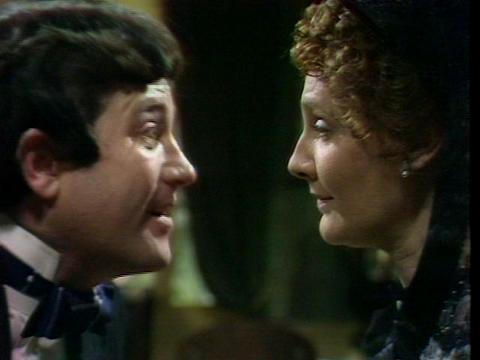
Phineas (Donal McCann) & Madame Max (Barbara Murray)
They are close together, face-to-face, and nearly hand-to-hand, recognize and understand one another, and yet they cannot overcome the barriers of social life.
Madame Max. “But why? Out of sheer pride.”
Finn. “No more than that. It is because you’re a woman and young and beautiful, and no man may take wealth from your hands, and that is all there is to be said about that. Don’t let’s talk about it any more.” (Lizzie says this of her determination to keep her diamonds, very close parallel wording.)
Madame Max. “There is one more thing to be said, Mr Finn. You say you will not take money from my hand.”
Finn. “No, Madame Max, I cannot do it.” (He falls back in his chair, clipped accents.)
Madame Max. “Then take the hand first, Phineas … when the hand and all that it holds are your own, you may receive from it without dishonor.” [Close ups of her face begin]
He looks grief-striken as she puts her hand out. [Close up of his face.]
Madame Max. “Take it, Phineas. Make it your own. And then you may take anything which it and the rest of me as to offer.”
Sorely tempted, he puts up his hand and brings it close to hers, and then makes a fist and draws back, just.
Finn. “I can’t!”
Madame Max. [Close up] “Why not Phineas? Your hand is so close to mine. Why do you not take it?”
Finn. “I can’t tell you. God knows I am sensible of all you have to offer.”
Madame Max. “And yet you reject it?”
Finn. “I must.” (Resolutely now, but clenched.)
Madame Max. “Your hand was so close to mine.”
Finn. (Sighs and leans over his hands and doubled over in chair.) “You must go now.”
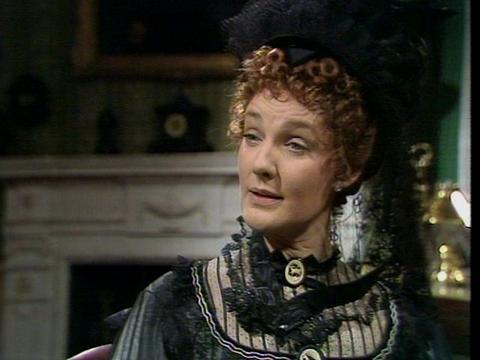
Barbara Murrray photographed to emphasize her age & life weariness; look at the wrinkles on her neck.
Madame Max. “Yes I must go back to Vienna, Mr Finn.”
She gets up very suddenly.
He looks down in anguish.
She gets up and goes over to the door, turns round, a much more controlled look of frustrated despair on her face, and then she leaves.
Moving is the open offer of a self without pride; it’s (many assume) so rare and of course rarely seen publicly. It’s beautiful in its humility. It is a soap opera idealization, or a perspective of female longing for connectedness, caring, for (at least in my experienced) such offers are not often met with such beautiful love and tact and acceptance. What I have seen are often hard faces, sharp no’s, embarrassed silences, and apathy.
**************
Juxtaposed immediately to the above is a second discordant dramatic scene between potential lovers, Scene 7 the opening of Episode 17, “Lord Fawn Visits”. This is taken from Trollope’s Eustace Diamonds, Ch 10, pp. 130-32 (1972 Penguin ed Stephen Gill), where Lizzie first tells Fawn about the diamonds, and Ch 14, pp. 164-67; a number of lines and the thrust of the argument also come from Fawn’s letter, p 168.
We see Lord Fawn holding his own against an onslaught of bullying manipulative aggression by Lizzie Eustace. The reason: he’s not yet married to her and so he has something she wants (marriage to a peer, respectability), and which is as yet his to withhold no matter how she may threaten. Here he is telling her he will not marry her unless she gives the diamonds over to the Eustace family lawyer, Mr Camperdown, also (he says) his lawyer, a man he trusts:
Scene 17: Inside Portray Castle
Establishment shot: we see Fawn drinking, with a set of very fancy glassware nearby. The lighting is dark to black. This is typical of the scenes at Portray castle throughout.
Bridging Shot: Lizzie playing the harp in a very harsh timbre
Character performing for other character(s): “Oh my love is like a red red rose That’s newly sprung in June” (Burns’ text, Anglicized)
(she strikes the harp across hard)
“Oh my love is like a melody
That is sweetly played in tune”
Dialogue about to start; Fawn tries to speak but she sings on, interrupting him and he smiles
“As fair art thou, my bonny love,
That is how deep in luve am I;
And I will luve thee still, my dear,
Till a’ the seas gang dry.”
Dialogue now begins.
Fawn: “My dear Lizzie, I really must come to the object of my visit. Since I saw you last, I have been to Mr Camperdown.”
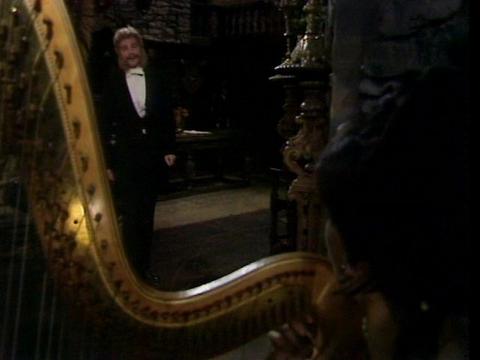
We glimpse him through her harp.
Lizzie: “The man who sends me horrid letters about the diamonds.”
Fawn: “Just so. The Eustace family lawyer, and as it happens my own.”
Lizzie: “Frederick, do not tell me you have come all this way up to Scotland just to talk about Mr Camperdown. (She comes over lovingly supposedly and he responds with a gentle smile, actually slightly opening up. Badel wears one of these push-up bras and pushes up her breasts further. She is the first woman in this series to wear one of these contraptions.)
Lizzie: “Frederick, don’t tell me you have come all this way up to Scotland just to talk about Mr Camperdown” (repeating, coy).
Fawn: (He becomes yet softer and friendly.) I do hope not. But we must at any rate talk about him … ah heh heh heh … Lizzie, Mr Camperdown is quite clear those diamonds are family heirlooms. They cannot be yours to keep. They’ve been passed down the family for generations along with other such jewels and they belong with them in the bank. (Slightly scolding tone as she turns away to ignore him.)
Lizzie: “But that is just it. Sir Florian gave them to me. I remember the scene as if it were yesterday. ‘My beloved wife,’ he said, ‘I know that I shall not be with you for much longer and I would wish that you may have one from special thing by which you may remember me forever. Take this necklace, my beloved, and with that, he fastened it about my throat …” (and she makes a gesture of framing her neck with her arms, one she will do each time she tells this story, making one think of someone also strangling her and meant to be sexy, seductive a come-on)
Fawn (looks uncomfortable at this kind of thing and helpless) ” ... wo.. ... wha ... whatever … Sir Florian may have said, Lizzie, those diamonds were not his to give.”
Lizzie: “So the husband that I adore was a liar.”
Fawn: ”... He was very ill and he was mistaken. In any case … at [any rate?] ... those diamonds should be placed in safe keeping.”
Lizzie: “But they are in safe keeping my keeping. I’ve had a safe especially made for them and I carry them wherever I go” (laughs unpleasantly).
Fawn: (Bursts out) “Carry them wherever you go! Lizzie, those diamonds are worth tens of thousands of pounds. Mr Camperdown … ”
Lizzie (jumping up from couch): “Bother Mr Camperdown! My late husband gave me those diamonds and there’s an end of it.” (The last phrase is also spoken by Phineas to Madame Max’s offer of herself and wealth, and later by Frank to Lizzie when he takes Fawn’s stance.)
Fawn: “They’re up here in Scotland with you.”
LIzzie. “Of course.”
Fawn. “Then they must be restored at once. If you will trust them to me, I will give them over to Mr Camperdown.”
Lizzie. “But why am I to surrender my own property?”
Fawn. “To satisfy my honor. Oh my dearest girl, I cannot possible allow that necklace to be brought into my house.”
Lizzie. “My dearest Frederick, no one though of taking it into your house.”
Fawn. “Well, what were you intending to do with it, my love.”
Lizzie. “Keep it in my own, my sweet.”
Fawn. “It does not suit me to have my wife seen wearing jewels belonging to the Eustace family.”
Lizzie: “But I am not your wife, my lord, not yet.”
Fawn (suddenly strong) “No! Nor yet.” (He faces her down.)
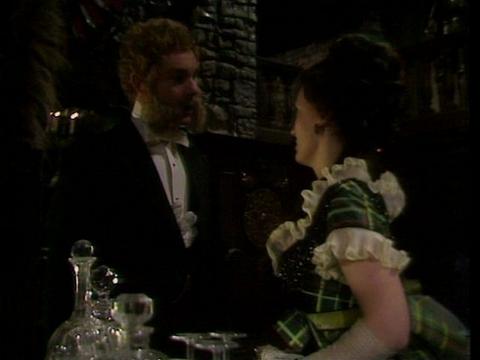
ord Fawn (Derek Jacobi) & Lizzie Eustace (Sarah Badel)
Lizzie looks at him.
Fawn. “So you will oblige me by giving up those jewels.”
Lizzie. “I will not be robbed of what is my own.”
Fawn. “But Lizzie (choking out strained sounds as words) Eustace, they are not your own.”
Lizzie. ” Oooh! well … as to that Lord Fawn we must agree to differ [we hear the wind in the castle], but please remember if you continue to bully me like this … ”
Fawn. “Well I …. ”
Lizzie. (puts up her hands).”If you ill treat me any further and in any way, I have friends who will protect me and who will secure my right. My cousin Frank Greystock for one. He’s a barrister and he knows all about the law and I am determined to seek his advice.”
Fawn stumbles a bit and walks over to her.
She eludes him and is seen walking into a dark hall, a dungeon-like cave, stone for walls, a turret
Lizzie: “Harassed as I am by these unjust demands for my own property” (nervous tones, she is getting slightly hysterical, perhaps a put on) ....
She is glimpsed running up the turret stairs.
He looks about him distressed.
A gate bangs hard
**************
Third, and last, from towards the end of 6:12, snippet from Scene 22, Episode 20, “Lizzie’s Guests.” Mrs Carbuncle, Lord George de Bruce Caruthers and Mr Emilius have arrived after a long journey, and are tired from bad service, weary of their kind of life, and hungry. The material for this is taken freely from a group of scenes from ED, starting with Ch 36 (the second volume, “Lizzie’s Guests”), Ch 43 (cf pp. 428-29, ”’I should sell them,’ said Mrs Carbuncle”), Ch 45 (the conversation on the train to London).
Mr Emilius (trying to smooth over and flatter after Lord George has denied a desire to cut Lizzie’s throat, though not Mrs Carbuncle’s): “At least, you have owned to a virtue, my Lord, chivalry to the ladies”.
Lord George: “Oh ho! Chivalrous am I, and what do you say to that, Jane?”
Mrs Carbuncle: “Well putting it as politely as I can, I’d say you were a bohemian.”
Lizzie: “Oh how glorious that sounds. What does it mean? Perhaps you will instruct me, Lord George.”
Camera on Frank’s disapproving expression; he does not like that Lord George and Jane Carbuncle are openly lovers.
Mrs Carbuncle: “I will instruct you, my dear, but not on an empty stomach. What time is dinner?”
Lizzie: “Oh, as soon as you’ve all changed. This way.” (Begins to move to dark corridor leading up turret.)
Mrs Carbuncle: “Food and drink is all I live for these days, my dear, somuch more satisfactory than lovers. An empty plate don’t hang about you quarrelling all night long. It’s just taken away by the footman.”
Mr Emilius: “Ah! Remember Mrs Carbuncle that gluttony is as heinous a sin as concupiscence.”
Mrs Carbuncle: “And just as expensive, but at least it don’t look so ridiculous while it’s going on.”
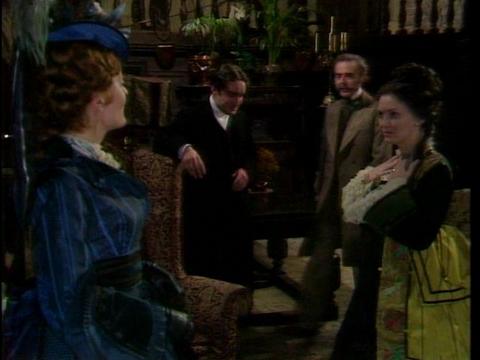
Mrs Jane Carbuncle (Helen Lindsay) having a joke at Lord George (Terence Alexander)’s expense with Lizzie and Mr Emilius (Antony Ainley) all courtesy standing by
Mr Emilius laughs.
Lord George: “Thank you.”
Camera on Frank blowing out his cheeks.
The next scene (21) at Matching Priory: we see each of the principals, Madame Max, Lady Glen and Plantagenet Palliser glittering with jewels and overdressed as they sit round the again Duke in his nightgown; the Duke has very bad indigestion after he was given a glass of orange curaco because he began to have a tantrum like a child (in a scene in Episode 19, “Frank Returns”).
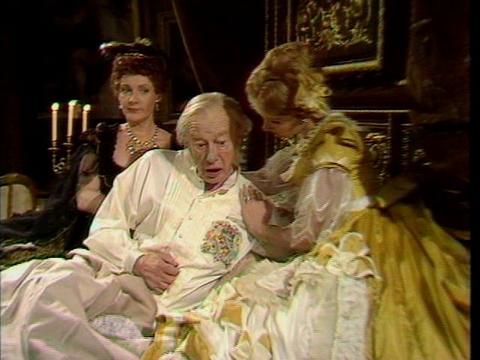
Duke of Omnium (Roland Culver) has indigestion from orange curaco, Lady Glen (Susan Hampshire) pats his back and Madame Max comically stern
Then Scene 22 again in the same dark room, just before dinner.
Establishment shot: Lizzie looking glum (a common expression on her face throughout) and extravagantly overdressed; in front of mantelpiece.
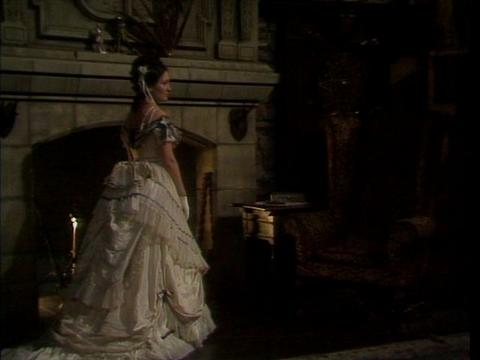
Lizzie waits for her guests to come down to the dinner for which she has paid
Bridging shot: Mrs Carbuncle leads others out of turret.
Dialogue.
Mrs Carbuncle: “Ah! Here we are, my dear, and I hope we can go in at once.”
Lizzie: “As soon as Mr Emilius and my cousin are down.”
Mrs Carbuncle: “Why is it that custom forbids even a glass of sherry before dinner. It would be such a help while I was waiting.”
Lord George. “If I know you, my dear, you had all the help you needed while you were dressing.”
Lizzie laughs and laughs. Very amused.
My heart quite warmed to Raven’s Mrs Carbuncle. Like Trollope’s character (though much later in the book), after dinner, Raven’s Mrs Carbuncle advises Lizzie to sell the diamonds; at least then she will have the money; as it is, they are in danger of being stolen. And what use are they really? In Trollope’s “Matching Priory” (Ch 47), Madame Max says Lizzie deserved to have the things stolen because she travelled around with them; both experienced women know Lizzie will be a target of relentless aggression and not hold onto them by herself. Raven’s Mrs Carbuncle’s not bullying and driving mad to harassment an illegitimate daughter as in Trollope’s novel (Trollope’s tragic heroine, Lucinda Roanoke is omitted). Though Raven and Trollope’s Lord George has perhaps come to woo and marry Lizzie, Raven’s Lord George and Mrs Carbuncle have not left off being open lovers and come to live off Lizzie so they are a parallel to Lizzie and Frank while Frank stays there (so like Fawn, Frank doesn’t mind betrayal as long as it’s kept quiet). Emilius is the smooth cavalier servente who lives off such women. She drinks to keep jolly and pleasant, she likes to eat (again shocking the “prim” Frank Greystock, all the gentleman in his fancy tux with expensive cigar who drinks just as much) her advice in this film is to sell the diamonds. I suspect Raven likes her too and wishes he could give her more to do.
**************
Just about all the scenes at Portray inside the castle are filmed in half-dark, gleaming colors, lurid, you can hardly see them clearly—as opposed to Phineas and Mary in clear daylight prosaic outfits, and the Matching group also well lit, but gorgeously dressed: lots of jewels on Marie and Lady Glen as if echoing like a Victorian novel in multiplot parallel fashion the rather hideously overdone necklace Lizzie holds onto with such glittering ferocity.
The scenes about the orange curacoa are taken from a single sentence in Phineas Redux, Ch 30, pp. 268-69: “Madame Goesler remembered how he looked with his nightcap on, when he had lost his temper because they would not let him have a glass of curacoa”.
See various links and a concise summary of 1:1-3:6, 4:7, 4:8, 5:9, 5:10, and 6:11.
Ellen
--
Posted by: Ellen
* * *
Comment
commenting closed for this article
